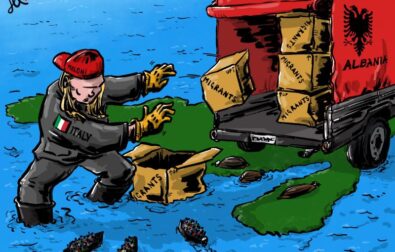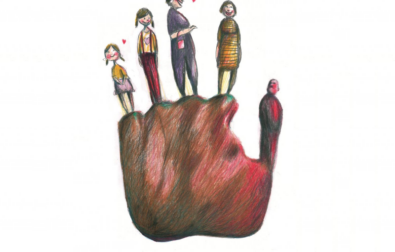Claim to be verified: With the fall of Bashar al-Assad’s regime in Syria on 8 December 2024, some political figures linked to the far right proposed the deportation and repatriation of Syrian refugees, and many European countries - France, Germany, Norway, Denmark, the Netherlands, Belgium, Sweden, Greece and Italy - announced that the examination of asylum applications from Syrian citizens would be suspended.
Background: The end of Assad’s dictatorship and the taking of power by the General Command, led by the Islamist group Hayat Tahrir al-Sham (HTS), brought an end to the civil war that started with the uprising in March 2011. This allegedly signals a return to normality in Syria, which would mean that the conditions under which Syrian citizens could apply for asylum in Europe are no longer present, and European countries can legitimately refuse to process asylum applications, and send Syrian refugees back to their country.
According to the United Nations High Commissioner for Refugees (UNHCR), there were approximately 1.2 million refugees of which 124,000 asylum seekers of Syrian origin in the European Union in the first half of 2024. In Italy, there are 3,500 Syrian refugees and just over 250 asylum seekers.
While the terms “refugee” “asylum seeker” and “stateless person” are often used interchangeably in everyday speech, they refer to three very different realities.
| Definitions |
| Asylum seekers are people who have left their country due to fear of persecution or violation of their rights, and are seeking legal protection in another country. Refugee status, on the other hand, is one of the types of legal protection that can be granted to an asylum seeker, provided he or she meets certain requirements. Subsidiary protection is another, less protective status for applicants who do not qualify for refugee status. The status of statelessness concerns people deprived of any nationality, with all the consequences this entails. |
It is therefore clear that every Syrian refugee, in the legal sense of the term, is indeed recognised by the state, which provides them with protection and a residence permit. If the examination of asylum applications is suspended, it is not Syrian refugees who are targeted, but rather asylum seekers, i.e. those who have applied for international protection.
The decision to suspend these applications, as the Italian government would like to do, concerns the latter group.
Italy
Filippo Ungaro, UNHCR spokesman in Italy, clarifies in an interview with Internazionale that “some states have suspended the decision-making process on applications for international protection submitted by Syrian nationals until the situation in the country has stabilised, and reliable information on the security and human rights situation is available to assess the international protection needs of individual applicants”.
However, for UNHCR, given the uncertain situation in Syria, “it remains crucial that people are still able to apply for asylum and have their case examined. Similarly, Syrian asylum seekers who are waiting for the decision-making process on their applications to resume must continue to be able to enjoy the same rights as all other applicants, including those regarding reception conditions”.
According to UNHCR, Syria cannot be considered a safe country for the time being, and no pressure can be put on refugees in Europe to return to a country where there is a serious humanitarian situation. As Ungaro reiterates: “Given the rapidly changing circumstances in Syria, and the high level of uncertainty about short and medium term developments, UNHCR is currently unable to provide detailed guidance on risk factors for Syrian asylum seekers that may lead to international protection needs. Today, more than 90 percent of Syrians in the country are in need of humanitarian assistance”.
France
In France, asylum applications are examined by the French Office for the Protection of Refugees and Stateless Persons (OFPRA). While OFPRA cannot refuse to examine an application, it can still decide to temporarily suspend assessment, which is what OFPRA announced it would do on 9 December, after the fall of the Assad regime. For the time being, OFPRA has stuck to this decision. In 2023, 4,465 applications were submitted. In 2024, the number was about 2,500. According to OFPRA, 700 are still being processed.
“In France, the law sets out the conditions for the [termination] of international protection,” explains Claudia Charles of GISTI (Groupe d’information et de soutien des immigrés). This right is based on the Geneva Convention, which determines refugee status and its conditions. It stipulates, among other conditions, that termination of this status is possible if “he can no longer, because the circumstances in connection with which he has been recognized as a refugee have ceased to exist, continue to refuse to avail himself of the protection of the country of his nationality”.
In simple terms: if the situation that provoked departure - fear of persecution due to ethnicity, religion, opinion, etc. - is no longer relevant; if there has been a fundamental change in the political regime of the country in question; if a judicial system has been established that effectively guarantees fundamental rights throughout the territory; then refugee status may cease to apply.
As for subsidiary protection, a status that provides less protection than refugee status, this can be revoked on similar grounds. This status can potentially be revoked in cases of fraud or serious crime, for example. However, such cases must be examined case-by-case, as Claudia Charles explains.
As for the revocation or non-renewal of a residence permit, which can potentially lead to expulsion, this is possible under certain conditions, in particular if the person concerned has been criminally convicted or represents a threat to public order. Expulsion proper is also governed by French law.
So, while cases must be analysed case-by-case at every stage in the process, the return of Syrian refugees does not seem like a possibility for now, given the unstable political situation in the country.
In a statement published on 17 December, the UN High Commissioner for Refugees writes: “UNHCR has published an updated position on returns to Syria, which emphasizes the principle of non-refoulement (or no forced return) and the right of Syrians to access asylum. While protection risks related to persecution by the previous government have decreased, other risks for particularly vulnerable groups may persist or emerge.”
For Gianfranco Schiavone, president of the Italian Solidarity Consortium in Trieste and an expert in migration law of the Association for Juridical Studies on Immigration (ASGI), it must be made clear that the returns to Syria after 9 December from Lebanon and Turkey are voluntary, and have no direct impact on the situation for Syrians in the European Union: “In Europe we have specific regulations for international protection that are guaranteed. We also have to evaluate the material conditions of Syrians in Lebanon or Turkey compared to those in Europe. Syrians in Lebanon live in precarious conditions, and in some cases lack legal protection. Some in these countries do not even have a residence permit. This situation cannot be compared to that of people who have been living in the European Union for years and who will give careful consideration to their future choices”.
If security conditions in Syria happen to change, it is possible that some European countries could revoke the refugee status of those who have already obtained it. According to Schiavone, however, this is a very long process, which would entail several steps that have yet to be ruled out: “European law [...] provides for the possibility of revoking international protection in the event that protection needs have ceased, but at the moment it is not possible to adopt such a measure for Syrians, given the current conditions of absolute uncertainty within the country. In any case, these would be individual measures.”
Meanwhile, violent fighting between HTC and Alaouite forces loyal to the Assad regime broke out in early March in the coastal region, leaving more than 1,000 people dead and dozens more injured, according to the Syrian Observatory for Human Rights (a London-based NGO). This has prompted the interim government to impose a curfew in the port cities of Latakia and Tartous. Clashes were also reported in the cities of Homs and Aleppo. In this context, it is all the more unlikely that Syria will be granted the status of a safe country any time soon.
This article was produced with the support of the European Media and Information Fund (EMIF). It may not necessarily reflect the positions of the EMIF and the Fund Partners, the Calouste Gulbenkian Foundation and the European University Institute.
The sole responsibility for any content supported by the European Media and Information Fund lies with the author(s) and it may not necessarily reflect the positions of the EMIF and the Fund Partners, the Calouste Gulbenkian Foundation and the European University Institute.
Do you like our work?
Help multilingual European journalism to thrive, without ads or paywalls. Your one-off or regular support will keep our newsroom independent. Thank you!



















